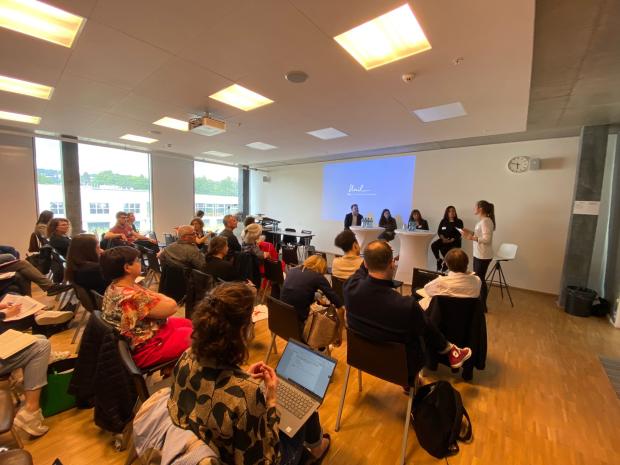
On Monday 8 May 2023, more than 50 professionals and experts met to discuss the subject of divorced or separated families. They focused in particular on intra-family relationships and especially on the relationship between the child and the non-custodial parent as well as the relationship between the child and his/her in-laws (social parents).
Read the editorial "Prendre la famille par la main" (online / pdf) and the article "Mieux protéger les enfants quand leurs parents se déchirent" (online / pdf) published in the "24 Heures" on June 6, 2023.
Each separation leads to a reconfiguration of family relationships, particularly with the children. In 85% of cases, the non-custodial parent is the father, who risks a reduction in contact with his children. What role do the professionals involved in this separation have in preserving these links? What are the needs of families? In order to identify avenues of reflection, an exploratory study was conducted in the Canton of Vaud by Prof. Laura Bernardi and Gentiane Schwarzer. As part of this study, the researchers conducted interviews with various service providers (associations, courts, lawyers, parapublic institutions) as well as with the families who used them.
A round-table discussion brought together Alessandra Duc Marwood (CHUV / Les Boréales), Carine Carvahlo Arruda (PS deputy, responsible for equality UNIL), Gloria Repond (HES-SO VS) and Frédéric Vuissoz (Direction générale de l'enfance et de la jeunesse, Vaud) in order to discuss ways to better protect family ties in situations of separation. Three short conferences started the forum, with a first intervention about the issues within the reconstituted family.
Dr Gloria Repond recalled that more than 60% of the people she met were experiencing difficulties in the relationship between (step)parent and child. 70% of them also consider that living in a stepfamily involves difficulties, above the clinical threshold. In this context, various services have been identified to support these families, in particular the provision of discussion forums for stepfamilies, so that they can be socially recognised.
See the full presentation in PDF by Gloria Repond
Psychiatrist Alessandra Duc Marwood focused on families living in a situation of violence or control. In these cases, working on parallel parenting is appropriate if the parents' perceptions of the children are similar, and the differences are related to educational principles. On the other hand, parallel parenting is harmful to the child's development if it affects the child's competence. She also stresses that carers should ensure that they juxtapose the views of both people in the couple and work in a network to get as complete a picture as possible.
See the full presentation in PDF by Alessandra Duc Marwood
Gentiane Schwarzer presented the results of the exploratory study conducted at the University of Lausanne, which focuses on the fragility of ties within blended families. This research has three major challenges: to study the fragility of ties, to act on parental conflicts and to preserve ties within the blended family. Among the avenues for action, it has identified the need to increase the training of professionals and tools to better respond to the issues (type of conflict, needs of stepfamilies); the establishment of safeguards against false allegations by one parent against the other and to strengthen restorative justice; and the strengthening of networking.

